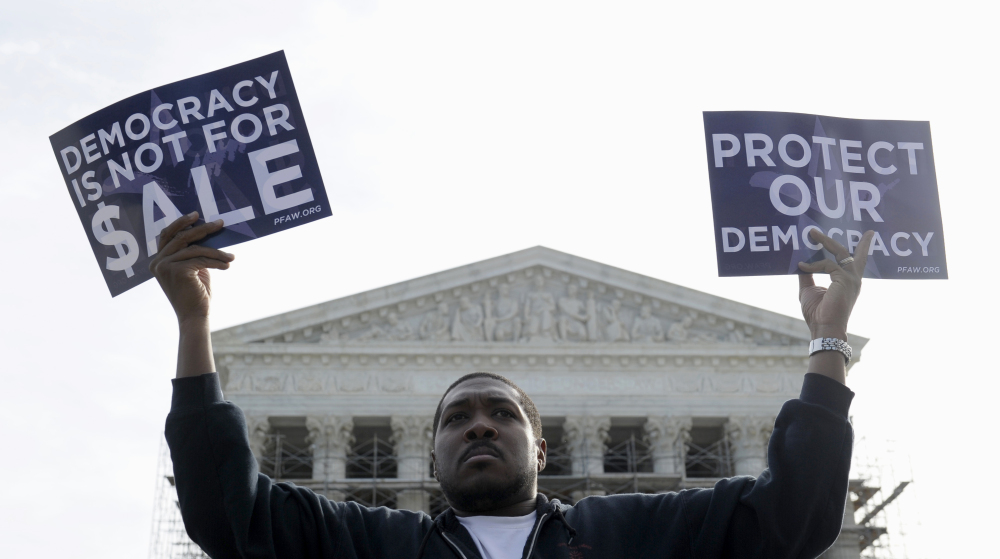WASHINGTON – The Supreme Court on Wednesday further opened up the taps for political campaign contributions, with a bombshell ruling that removes long-standing limits on how much total money an individual can contribute to federal candidates.
In what amounted to a 5-4 decision, the court’s conservatives declared that the aggregate contribution limits imposed four decades ago violated the First Amendment’s free-speech protections. Though individual donations may still be limited, the ruling frees donors to spread their wealth across as many candidates as they can find.
That means a wealthy individual could start contributing more than $3.5 million to party committees and candidates over two years.
“They … intrude without justification on a citizen’s ability to exercise the most fundamental First Amendment activities,” Chief Justice John Roberts Jr. wrote of the aggregate limits.
The decision erases the aggregate limit of $123,200 for a two-year election cycle.
Roberts’ 40-page opinion, joined in full by three other conservative justices, continues the court’s dismantling of congressional efforts to overhaul campaign financing. Its constitutional reasoning may leave the remaining campaign-finance restrictions at risk, and it prompted nationwide demonstrations.
The court’s four Democratic appointees dissented from the conservative majority’s opinion.
“It understates the importance of protecting the political integrity of our governmental institutions,” Justice Stephen Breyer wrote. “It creates a loophole that will allow a single individual to contribute millions of dollars to a political party or to a candidate’s campaign.”
The ruling in the case, called McCutcheon v. Federal Election Commission, was not unexpected. Advocates from all sides were primed to respond quickly – and predictably.
Republican National Committee Chairman Reince Priebus called the ruling an “important first step toward restoring the voice of candidates and party committees and a vindication for all those who support robust, transparent political discourse.” The RNC raised $409 million during the 2012 cycle.
Democratic Sen. Charles Schumer of New York, though himself an aggressive fundraiser, denounced the ruling as “another step on the road to ruination.” Schumer has $11 million sitting in his campaign treasury.
Justices Antonin Scalia, Anthony Kennedy and Samuel Alito joined Roberts’ opinion. Justice Clarence Thomas concurred, making for an effective 5-4 majority, though he wrote a separate, more purist, concurring opinion calling for the end of other campaign limits as well.
The decision Wednesday targets one part of a 1974 campaign finance law, enacted in the wake of the Watergate scandal. Limits were placed on how much an individual or committee could give a particular candidate. Aggregate limits were also set, capping the total that a donor might contribute to all candidates and committees.
In a famously complex 1976 decision, Buckley v. Valeo, the Supreme Court upheld much of the 1974 law and divined a difference between campaign donations and campaign spending. Spending by a candidate was deemed tantamount to political speech, and so received greater First Amendment protection. Campaign donations to the candidate were deemed potentially corrupting and hence subject to regulation.
Send questions/comments to the editors.



Success. Please wait for the page to reload. If the page does not reload within 5 seconds, please refresh the page.
Enter your email and password to access comments.
Hi, to comment on stories you must . This profile is in addition to your subscription and website login.
Already have a commenting profile? .
Invalid username/password.
Please check your email to confirm and complete your registration.
Only subscribers are eligible to post comments. Please subscribe or login first for digital access. Here’s why.
Use the form below to reset your password. When you've submitted your account email, we will send an email with a reset code.